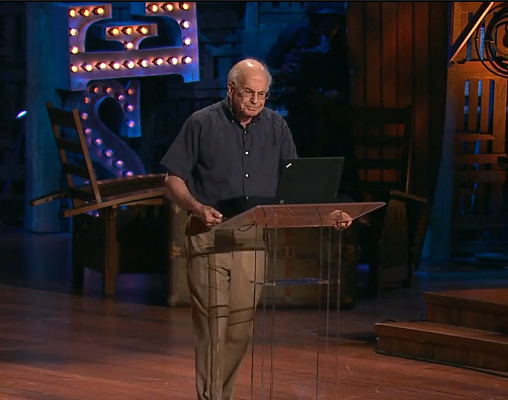(单词翻译:单击)
演讲文本
From the point of view of the experiencing self, clearly, B had a worse time.
从经验自我的角度来看,病人B显然是比较难受的。
Now, what you could do with Patient A, and we actually ran clinical experiments,
那么病人A的情况该如何解释,我们实际做了一个临床试验,
and it has been done, and it does work
当实验完成时,我们也得到了预期的结果,
you could actually extend the colonoscopy of Patient A
事实上我们可以延长病人A的检查时间
by just keeping the tube in without jiggling it too much.
从而减缓导管的震动程度。
That will cause the patient to suffer, but just a little and much less than before.
虽然病人还是会疼,但已减轻许多了。
And if you do that for a couple of minutes,
假如继续这样下去,
you have made the experiencing self of Patient A worse off,
你将会使病人A的经验自我的感觉更糟,
and you have the remembering self of Patient A a lot better off,
但病人A的记忆自我则会感觉好多了,
because now you have endowed Patient A with a better story about his experience.
因为你给了病人A一个好一点的故事,一个好一点记忆他病痛经历的故事。

What defines a story?
怎样给故事定义好坏?
And that is true of the stories that memory delivers for us,
并且记忆告诉我们的故事是真实的,
and it's also true of the stories that we make up.
我们讲述的故事也是真的。
What defines a story are changes, significant moments and endings.
故事的好坏取决于高潮时分及结尾时刻。
Endings are very, very important and, in this case, the ending dominated.
结尾是非常重要的,上面的这个故事就是由结尾所主导的。
Now, the experiencing self lives its life continuously.
现在,经验自我延续这个生活经验。
It has moments of experience, one after the other.
他也拥有片刻的经验,一个接一个。
And you can ask: What happens to these moments?
你会问:“这些片刻怎么了?”
And the answer is really straightforward: They are lost forever.
答案很简单:他们永远消失了。
视频及简介
演讲简介:
通过使用休假和胃肠镜检查的例子,诺贝尔奖获得者及行为经济学创始者丹尼尔·卡纳曼向我们揭示了“经验自我”和“记忆自我”是如何使用不同角度来理解快乐。这一新见解将会对经济领域、公共政策领域以及我们的自我意识产生深远的影响。


